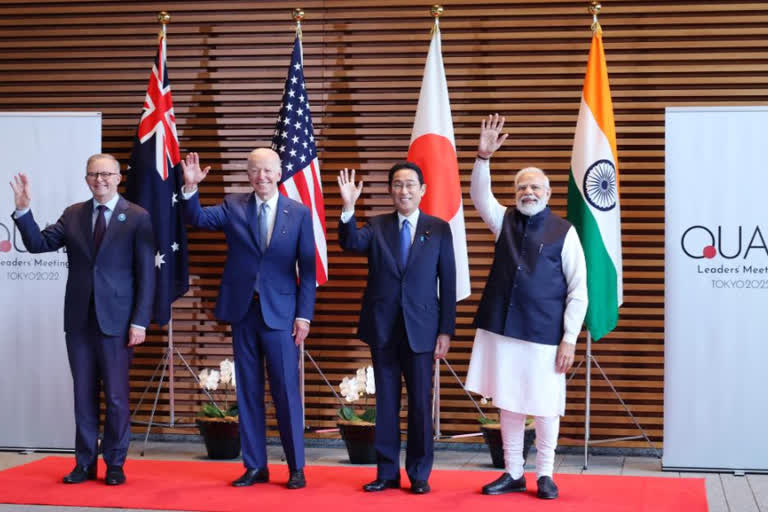NEW DELHI: With at least eight Russian and Chinese warplanes conducting a joint military exercise in the Sea of Japan as the second in-person Quadrilateral Security Dialogue or Quad meeting got underway on Tuesday in Tokyo, there was tremendous pressure being applied on India to join the US-led platform against Russia in the ongoing conflict in Ukraine during the second in-person Quadrilateral Security Dialogue or Quad meeting in Tokyo on Tuesday.
While India’s PM Narendra Modi and Australian PM Anthony Albanese skipped mention of the Russian military action in Ukraine in their opening remarks, US President Joe Biden and Japanese PM Kishida Fumio were scathing in their respective statements - underlining a subtle hint of existing differences. Admitted a senior US administration official: “With all the members of the Quad, there are some differences - the question is how they become - how they’re addressed and how they’re managed.”
Indirectly applying pressure on India to join the US-led effort against Russia, President Biden linked the Ukraine conflict to groupings including the Quad. He said: “As long as Russia continues this war, we’re going to continue to be partners and lead a global response.” Caustic in his comment on Russia, Biden declared: “We’re navigating a dark hour in our shared history. The Russian brutal and unprovoked war against Ukraine has triggered a humanitarian catastrophe… And this is more than just a European issue; it’s a global issue… And the world has to deal with it, and we are.”
Expectedly, PM Kishida Fumio strongly toed the US line: “A grave incident which has fundamentally shaken the rule-of-law-based international order… We should never, ever allow a similar incident to happen in the Indo-Pacific… it is extremely significant for us to get together and show to the international society the four countries’ solidarity and our firm commitment toward the shared vision of a free and open Indo-Pacific.”
Biden and Kishida’s statements position the Quad against Russia thereby obliquely making India party to it signifying considerable pressure on India. On Monday, the US stepped up its anti-China position with Biden declaring that the US would come to Taiwan’s aid in case it was attacked by China. He said in a response to a question if the US would defend Taiwan militarily if China invaded: “Yes... that’s the commitment we made… The idea that it (Taiwan) can be taken by force... is just not appropriate. It will dislocate the entire region and be another action similar to what happened in Ukraine.”
The US posture is a departure from its traditional position that recognizes the ‘One China' policy and maintains “strategic ambiguity”. China claims the island-nation of Taiwan to be part of the mainland.
India is considered a ‘swing country’ as it has not yet condemned the Russian military action in Ukraine. Consequently, it has become embroiled in a tug-of-war between the US-led block of NATO countries and others and the emerging Russia-China axis, with both sides keen to enlist India’s support. Refraining from taking sides, India pursues a policy of strategic autonomy which prioritizes peace between the warring sides. India’s support is considered crucial as it is the second-most populated country in the world with a huge market. The IMF has also projected that India may become the world’s fastest-growing major economy in 2022 with a growth rate of higher than 8 per cent.
Yet certain gains have already been achieved in Tokyo like the Indo-Pacific Partnership for Maritime Domain Awareness (IPMDA). A multi-purpose key architecture that can also serve military needs, the will offer a new real-time, integrated cost-effective maritime domain awareness picture for the entire geography that connects the nations in the Pacific Islands, Southeast Asia, and the Indian Ocean region.
IPMDA will give the member countries the ability to know what is happening in countries’ territorial waters and in their exclusive economic zones. This acquires significance in the backdrop of China signing an agreement with the Solomon Islands and several incidents where high-tech People's Liberation Army Navy (PLAN) spy ships and submarines have been detected in Australia and elsewhere, very far from their home bases.
Read: Quad has gained significant place at world stage, says PM Modi



